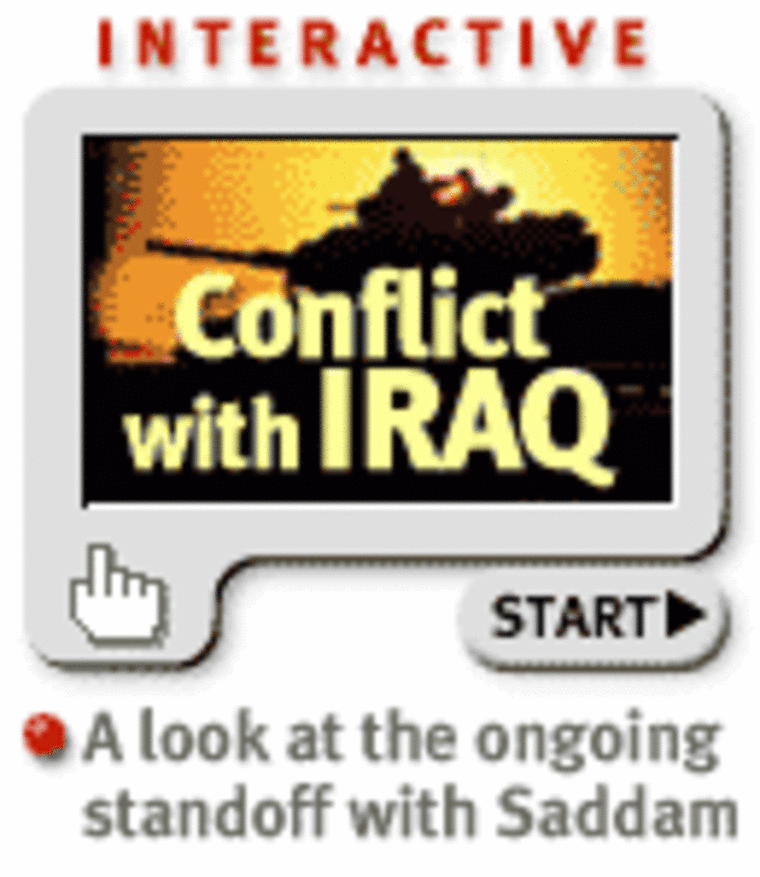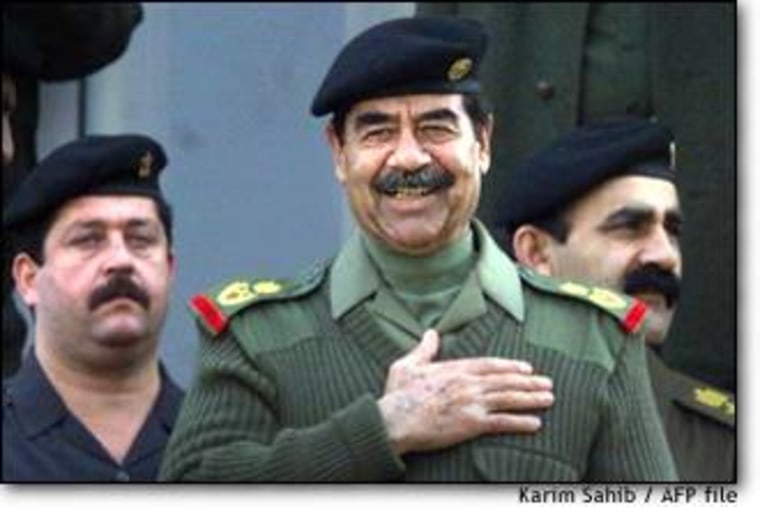For a decade, hawks and doves within the Republican Party debated whether former President George Bush erred in 1991 when he chose to halt the Gulf War short of Baghdad. In the wake of Sept. 11, it has been nearly impossible to defend half-measures of any kind. Reluctantly, even veterans of Bush 1.0 are conceding that while they won the Gulf War, they lost the peace. Today, the debate animating Republican foreign policy circles has shifted: the question is not whether 1991 was a mistake, but rather how to best correct it.
Now, a new argument is raging in the new Bush administration - call it Bush 2.0: How to rid the world of Saddam Hussein once and for all.
The existence of this debate is old news. Within George W. Bush’s government, it pits a diplomatically inclined group of Bush 1.0 veterans - Secretary of State Colin Powell, his deputy, Richard Armitage, most of the Joint Chiefs of Staff and an array of State Department and CIA “Arabists,” against a more hawkish group led by Deputy Defense Secretary Paul Wolfowitz and fed by a steady flow of outrage and ominous warnings from outsiders like Richard Perle, a former Reagan administration official, and former CIA Director James Woolsey.
The debate is complex, but it breaks down fairly neatly. The hawks want Saddam branded a “clear and present danger” to the United States and placed high on the war on terrorism’s agenda. The diplomats see such an attack as too disruptive, particularly when so many “loose ends” of the al-Qaida network still exist elsewhere in the world. The diplomats want to mop up fanatics in places like Yemen, Somalia and the Philippines before the country goes off and polarizes the world with a major assault on Saddam. They prefer to keep Saddam “in his cage” and argue that the hawks are overstating his strength.
WHO’S ON SECOND?
The question mulled over endlessly by inside-the-Beltway types these days is where President George W. Bush and his key confidante, Vice President Dick Cheney, come down on these issues. The two men, along with Defense Secretary Donald Rumsfeld and National Security Advisor Condoleezza Rice, have been evasive about their plans, for obvious reasons. It makes sense, regardless of their true feelings, to keep Saddam under the impression that he’s next on the agenda.
In truth, there seems no way of knowing right now which camp is winning this debate: Powell’s diplomats, or Wolfowitz’s hawks. One thing that can be said, however, is that the hawks are not waiting for an executive order to lay the ground work.
ENTER IRAN

As the investigative journalist Seymour Hersh has reported in recent editions of The New Yorker magazine, one of the more startling effects of Sept. 11 is a new and very active intelligence relationship between the United States and Iran. Americans accustomed to seeing the word “Iran” in the same phrase as “state sponsor of terrorism” may be shocked, but this is the world we now live in.
The fact is, Iran has been trying to undermine Saddam for years, and the Shiite Iranians have equipped and trained a force capable of doing what the CIA failed to do in northern Iraq in 1996: Lead an insurrection.
The group, which astoundingly has its own website, is called the . The group, believed to have up to 8,000 fighters, occasionally has infiltrated southern Iraq in a region north of Basra and has conducted raids on symbols of Saddam’s regime. Occasionally, the group, whose armed wing is known as the Badr Corps, has fought pitched battles with a similar exile group that Iraq supports that is seeking to overthrow Iran.
SHELL GAME
Confused? That’s understandable. This is, after all, the enemy of our enemies’ enemy. But according to Bush administration sources and those outside the administration seeking to press the Iraq option, the Badr Corps is currently being viewed as the “Northern Alliance” of Iraq. In essence, these sources say, the Iranian-supplied Badr Corps would strike in southern Iraq, already protected by the Anglo-American no-fly zone. The Corps would seize some territory, declare itself the legitimate government of Iraq and wait for western recognition. The United States could then extend its air cover to include Iraqi tanks and armored vehicles - reversing the failure of the first Bush administration in 1991 and allowing the Shiites of the region to throw off Baghdad’s rule. With much of northern Iraq already in Kurdish hands, Saddam, presumably, would be doomed.
While none of the sources described this plan as “a deal” with Iran, two officials described it as “a game plan.”
“There shouldn’t be anything particularly surprising about this to Saddam,” said the source. “He watches al-Jazeera. He saw what happened in Afghanistan, and he sure knows that the Badr Corps is there. Add some airpower and special forces, and you have a game plan.”
MODUS OPERANDI
It is important to understand that the current arguments in favor of a new war in Iraq have little to do with the Sept. 11 attacks or the anthrax-laden letters that circulated immediately afterward. Intelligence agencies and law enforcement officials believe the Iraqis might well have had contacts with Osama bin Laden’s al-Qaida group, and certainly it appears that a meeting between an Iraqi agent and one of the hijackers took place in Prague two years ago. But Iraq is not being viewed as a sponsor of the attacks, merely as a satisfied onlooker.
In fact, the basis of hawk’s position that Iraq poses an immediate threat to the United States rests on two assertions:
That Saddam Hussein has continued successfully to pursue chemical, nuclear and especially biological weapons programs that could eventually allow him to blackmail his neighbors or even the United States.
That Saddam Hussein has shown he can successfully foil American efforts to contain by ensuring the pain is felt by innocent civilians. By conservative estimates, economic sanctions now are thought to have contributed to the death of nearly 1 million people, many of them children. Clever placement of Iraqi radar and anti-aircraft missiles in residential areas ensures the constant bombings by U.S. and British planes patrolling the no-fly zone cause civilian casualties.
In fact, the experience of Bush 2.0 in trying to minimize anti-American backlash in the Arab world as it pursued a war in Afghanistan showed the second point to be true beyond a doubt. From bin Laden to Hamas to the anti-American Islamic fringes of Indonesia, the “massacre of innocent babies” in Iraq is a rallying cry. The flawed sanctions and no-fly patrols have been an tremendous recruiting tool for al-Qaida and other groups bent on the crudest forms of revenge.
WHICH DEVIL?
Right up until Sept. 11 - everyone from ex-President Bush on down continued to rationalize the fateful 1991 cease-fire decision. The reasons were many: fear that the Gulf War coalition would splinter (it did anyway); fears that the Soviets would object (they were hardly in a position, as it turned out). Even weakly, some argued that a drive on Baghdad would exceed the United Nations war mandate. Imagine that - the United States defying the United Nations.
The most damaging rationale, however, was an old saw that regularly has tripped up American foreign policy: the devil you know is better than the devil you don’t know. Leaving Saddam in power, America was told, would avoid a partition of Iraq, which in turn would strengthen Iraq’s enemy, Iran. Some thought that was a pretty weak argument in 1991 and were willing to take a risk. In 2001, with “risk” horribly redefined by the deaths of thousands of Americans and Iran basically on our side, that argument is infuriating.
“Fear of the unknown” is not a foreign policy, it is an excuse for poor leadership. Such fears keep Yasser Arafat employed as as mismanager-in-chief of the Palestinians. The same kind of thinking led the Clinton administration to treat the drunken Boris Yeltsin as if he were the last best hope for world peace, even as he allowed the mafia to take over Russia’s economy. Ferdinand Marcos, Augusto Pinochet, P.W. Botha - does anyone miss any of them?
Good people can differ over timing and tactics. But let’s hope at this point there is no one in Washington now who thinks that keeping Saddam in place is preferable to replacing him with some devil we don’t yet know. The real question is whether the United States can affect such a change without destroying its credibility in the world and the international structures that helped it prevail over its last great rival, the Soviet Union.
Michael Moran is MSNBC.com's International Editor.
